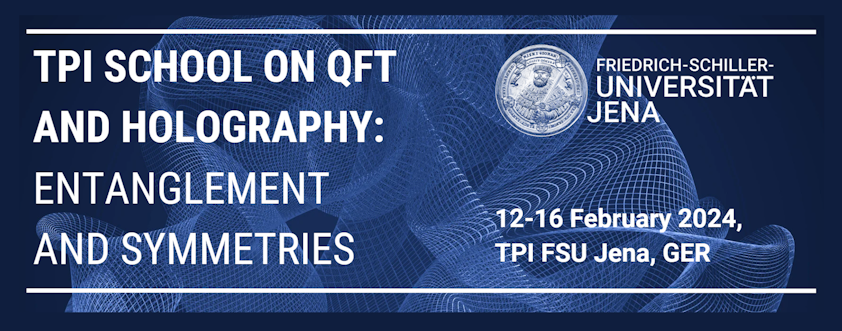The first edition of the TPI School focuses on quantum entanglement and generalized symmetries in QFT and Holography. While the former topic is long known to play a crucial role in our understanding of such theories, the latter has recently attracted the attention of the scientific community. The aim of the School is to form PhD students and postdoctoral researchers in these fields and discuss the connections of these two very hot topics...in cool weather!
The School comprises two in-depth classes, each involving about ten hours of blackboard lectures and tutorials. We are delighted that our lecturers are
Nele Callebaut (Institute for Theoretical Physics, University of Cologne, Germany)
Nabil Iqbal (Department of Mathematical Sciences, Durham University, UK).
Participants are strongly encouraged to contribute to the scientific activity by registering to the gong-show, planned on the 14th of February, or via a poster. Contributing students can apply for partial funding until the 15th of December 2023.
Registration is open until 20 Jan 2024.
Program
Entanglement in CFT and Holography - Nele Callebaut
In these lectures we give a pedagogical account of the replica trick derivation of CFT entanglement and its holographic counterpart, i.e. the Lewkowycz Maldacena derivation of the Ryu-Takayanagi formula. The application to an 'island set-up' for the calculation of black hole radiation entropy is briefly discussed. Further topics focused on are the relation to thermal entropy, thermofield double constructions and statements about the emergence of gravity from entanglement through reinterpretations of gravitational first laws.
Introduction to Generalized Symmetries: Principles and Applications - Nabil Iqbal
Symmetries are one of our most fundamental tools in the understanding of nature. We have recently learned of a new way to think about global symmetries in quantum field theories. Just as ordinary global symmetries are associated with a conserved density of particles, the new concept of higher-form symmetries are associated with a density of extended objects, such as strings and branes. Similarly, Non-invertible symmetries refer to symmetry operations where the charge generators don’t satisfy a simple group conservation law. Such symmetries exist in very familiar systems and present the possibility of constructing a new enlarged Landau paradigm that will include all of the phases of the matter. I will provide an elementary introduction to these new generalized symmetry principles and present some applications to gauge theories, statistical physics, and hydrodynamics.
(I’ll assume basic knowledge of quantum field theory; exposure to conformal field theory will also be helpful).

